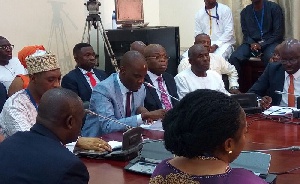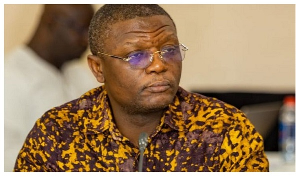The Minority National Democratic Congress (NDC) Members of Parliament (MPs) have sent a strong signal to the Jubilee House, informing the President, Nana Addo Dankwa Akufo-Addo, to order the Minister for Fisheries to immediately lift the ban on fishing.
Failure to comply with their notice will result in the marching to the Jubilee House, together with fishermen in the country for “dinner”.
According to the group, it beats their imagination for the Minister for Fisheries, Hon. Elizabeth Afoley Quaye, who has no locus per the Fisheries Act 2002 (Act 625) to place a ban on fishing for those in the value chain to bear the brunt of her action.
On Friday, July 13, 2018, the Minister for Fisheries on behalf of the President, Nana Addo Dankwa Akufo-Addo, announced the closure on all forms of fishing except for Tuna fishing in the Ghanaian Economic Exclusive Zones (EEZ) for one month.
The move, according to Madam Afoley Quaye, was to prevent the loss of small pelagic fishes.
She further stated that up to about 500,000 livelihoods will be cut if fishermen are allowed to fish throughout the year.
But her directive has not gone down well with the Minority NDC MPs.
They argued that the announcement made by the Fisheries Minister is at variance with the provision of Section 84 (1) of the Fisheries Act 2002, Act 625 which grants the Fisheries Commission the authority to declare areas of the fisheries and riverine system of Ghana closed to fishing.
At a press conference held on Tuesday, July 17, 2018, in Accra to state their position on the matter, the Ranking Member on the Food, Agriculture and Cocoa Affairs Committee, Hon. Eric Opoku said “the authority to declare a close season is the Fisheries Commission but per the press conference organized by the Minister, she declared a closed season on behalf of the President. We need to be aware that the Presidency is different from the Commission and where the law places responsibility on an institution of state due to its technical competencies, it will be a slap in the face of the law for another authority, be it higher or lower to conduct such an activity”.
They also noted that the ban on fishing in the entire Economic Exclusive Zone is a practical display of the government’s insensitivity to the plight of the hardworking fishermen and women since the decision will render thousands of people in the value chain jobless.
“Fishermen are only peasant people who live from hand to mouth. It is reported that there is an estimated 13,000 canoes in Ghana with an average 15 people per crew. This means about 195,000 people are directly refused fishing for a month. There is an established direct linkages of head potters, fish mongers and truck pushers amongst others estimated at about 100,000 people aside the numbers employed by the over 75 active trawlers and 400 semi-industrial vessels.
“In August, the fishing season picks up and this the period the fishermen are able to raise money to pay their debt and save some for the future. By September, another academic year begins and no sensitive government will deny its citizens the only means for keeping their children in school through the provision of school essentials. Since fishermen earn only per trip, it means that a day without fishing is just like losing a monthly salary and so the 27 days of the ban equates to 27 months of a salaried worker being denied employment and salary. How can the fishermen survive this?”
That notwithstanding, a ban on fishing in the month of August will further increase fish importation with dire consequence on the exchange rate, they emphasized.
Worried over the move by the decision of the Fisheries Minister, the NDC MPs want the President to call the Minister to order and to further lift the ban on fishing.
They also want the government to purchase a research vessel for the country to conduct regular surveys as promised during the welcoming of the Dr. Fridjof Nansen Vessel in Tema in 2017.
Further to that, they want the scientific community to determine the scientific areas where there are fish spawns so they can either close permanently or temporary to preserve the resources.
General News of Wednesday, 18 July 2018
Source: kasapafmonline.com

















